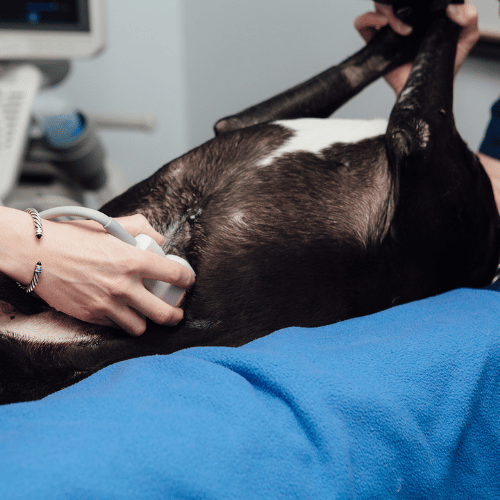Internal Medicine
Our skilled internal medicine specialists at Burlington Emergency and Veterinary Specialists are highly trained in diagnosing and treating especially complex or chronic medical problems.
Internal Medicine
When your pet faces issues in their internal environment, we provide care from our internal medicine department staffed by board-certified veterinary specialists in internal medicine. A veterinary internist is a veterinarian who’s undergone advanced training in how your pet’s internal body systems function, and in diagnosing and treating the most serious diseases that affect these systems.
At Burlington Emergency and Veterinary Specialists, our team of veterinary specialists is led by medical director Bryan Harnett, DVM, DACVIM, a board-certified veterinary internist who provides today’s most advanced diagnostic testing and treatment. Rest assured that your pet will receive the most thorough and thoughtful care available.
The conditions we treat
- Bleeding disorders or anemia
- Chronic sneezing or nasal discharge
- Chronic vomiting or diarrhea
- Conditions that require specialized diagnostics or treatment, such as radioactive iodine for hyperthyroidism
- Coughing and other breathing problems
- Disorders that require nutritional support with feeding tube placement or partial parenteral nutrition (PPN)
- Endocrine diseases such as adrenal disorders, complicated diabetes, thyroid disorders or Cushing’s disease
- Gastrointestinal disease
- Immune-related disorders
- Infectious diseases
- Kidney and bladder disease
- Liver disease
- Multiple disease conditions that make management difficult
- Pancreatitis
- Suspected neoplasia (cancer)
- Unexplained fever
- Unexplained weight loss
Comprehensive diagnostic capabilities
A timely, accurate diagnosis is essential for effective treatment. That’s why Burlington Emergency and Veterinary Specialists has invested in leading-edge diagnostic equipment and offers a full range of testing capabilities on site, including:
- Sophisticated diagnostic imaging to “see” inside your pet non-invasively; our technology includes digital X-rays, ultrasound and echocardiography, CT scans and fluoroscopy (“moving picture” X-rays).
- Interventional radiology (IR) refers to advanced imaging techniques used to guide the delivery of materials for diagnostic and therapeutic purposes. IR procedures include endoscopic placement of tracheal, urethral, and esophageal stents. This minimally invasive approach facilitates shorter hospital stays, decreased pain, and a more rapid return to function compared to surgery.
- Endoscopy, a minimally invasive procedure using a tiny video camera attached to the end of a flexible or rigid tube. This procedure allows the veterinarians to directly examine inside surfaces of hollow organs, find and extract foreign bodies, and collect biopsy samples of tumors or other lesions. The various types of endoscopy we perform include:
- Bronchoscopy to examine the bronchial tubes (airways)
- Colonoscopy to examine the colon, or large bowel
- Cystoscopy to look inside the bladder and urethra
- Laparoscopy to visualize organs in the abdominal cavity
- Rhinoscopy to examine the inside of the nose
- Thoracoscopy to visualize organs in the chest cavity
- Fine-needle aspiration or biopsy, a procedure in which a thin needle is used to draw cells or fluid from a lump or mass under the skin.
- Bone marrow aspiration or biopsy, which involves inserting a needle through the bone into the marrow cavity and extracting cells. When a larger sample is needed, a biopsy is performed, which involves placing a larger needle into the bone marrow to obtain a tissue sample.
- Advanced laboratory testing in our in-house diagnostic laboratory, which enables us to perform a wide range of tests and get rapid results.
- Blood pressure monitoring to monitor a pet’s blood pressure with the latest technology, detect abnormalities related to certain disorders, and ensure pets are doing well under anesthesia.
- Clinical trials to test the efficacy of innovative treatments versus the current standard treatment. As a respected specialty practice, BEVS often participates in important research trials, and when appropriate, you may be offered the opportunity for your pet to take part.
- Outpatient ultrasounds for non-invasive imaging needs are now available!
Extensive Treatment Options
Once we’ve diagnosed your pet’s condition, we’ll discuss all the available treatment options and formulate a treatment plan that you’re comfortable with. Treatment is always tailored to your pet’s unique situation and your family’s wishes.
We work closely with your family veterinarian
Throughout your pet’s diagnosis and treatment at Burlington Emergency and Veterinary Specialists, we keep your family veterinarian fully informed. This is important because we want to ensure a smooth transition when your pet returns to their primary care veterinarian for ongoing medical care.
Contact BEVS about internal medicine
To schedule a consultation with a Burlington Emergency and Veterinary Specialists veterinary internist, simply call us at (802) 863-2387.

